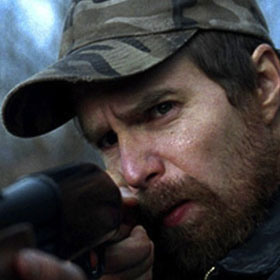'A Single Shot' Movie Review: A Thriller Too Ambitious For Its Own Good

2.5/5
A Single Shot, staring Sam Rockwell, is a beautiful, yet underwhelming thriller about an out of work hunter, John Moon (Rockwell), who accidentally kills a young woman and ends up being chased by her killer boyfriend and his criminal friends.
The dark drama starts out slowly with Moon waking up at dawn to go hunting. He lives in the outskirts of town in a beat up trailer alone. His wife has left him, taking their baby son with her, because of Moon’s self-imposed isolation: he wants to live a completely contained life, out in the woods.
Unfortunately for the film, the strained dynamic between Moon and his estranged wife remains in the background. As a character, Moon only becomes interesting through his interactions with others, and it’s a pity that his conflict is so isolated. One particularly enjoyable supporting character is Pitt (William H. Macy), an incompetent lawyer hired by Moon to help in his divorce and custody battles. Macy is delightful, as usual, but his presence is much too short to make a lasting impact.
The film is an adaptation of a thriller novel by Matthew F. Jones, who also penned the adaptation for the screen, which explains why the character of John Moon is so isolated throughout the film, and why his inner conflict fails to be effective on the screen. In a film, there is only so much an audience member can gather from the actions and look of a character, but in a book, the reader can spend pages upon pages with the character’s inner thoughts and feelings. The problem with the film adaptation of A Single Shot is that it failed to find a way to truly let the audience align with John Moon’s mindset.
Directed by David M. Rosenthal, A Single Shot desperately wants to be an ambiguous thriller, in which no one character is ‘good’ and no one character is ‘bad.’ But, the contrast between the good guy (Moon) and the bad guys (criminals who want to kill him) is too pronounced to really make the audience question whether or not to root for Moon. It is true that Moon opens the movie by killing an innocent woman, hiding her body and stealing her stash of cash – definitely not something audiences will root for. However, when the bad guys first pop up, they are so incredibly sadistic and terrifying that the audience feels no tension in wanting to root for Moon.
Joe Anderson is chilling as Obadiah, a truly insane ex-con from Moon’s past who is now in bed with Waylon (Jason Isaacs), the psychopath who is after Moon. Obadiah, tall, gangly and tattooed, approaches everyone he meets with a sickening smile, and every movement Anderson executes holds the threat of violence in a way that is both terrifying and mesmerizing.
The trick with dark, gritty thrillers like this one is that the characters have to be consistent. For example, as an audience it would be hard to believe that a man who is smart enough to wipe his fingerprints from a crime scene wouldn’t think about leaving his family vulnerable to the killers he is fighting with. But, that is exactly what Moon does. Later in the film, Moon continues to put innocent people at risk, exposing flaws in how his character is written. As an audience member, it’s hard to let yourself be taken away by the emotional direction of the film when crucial actions and plot twists are so obviously manufactured.
The forceful music does little help. Instead of making a moment subtly more powerful, the music used in A Single Shot draws so much attention to itself that it makes the audience more aware of being manipulated by the film.
A Single Shot sounds good on paper: beautiful cinematography, solid acting, and an intriguing premise, but it lacks the exciting denouement of a good thriller. All in all, A Single Shot is an interesting film, but it is also predictable and utterly forgettable.
Get the most-revealing celebrity conversations with the uInterview podcast!








Leave a comment